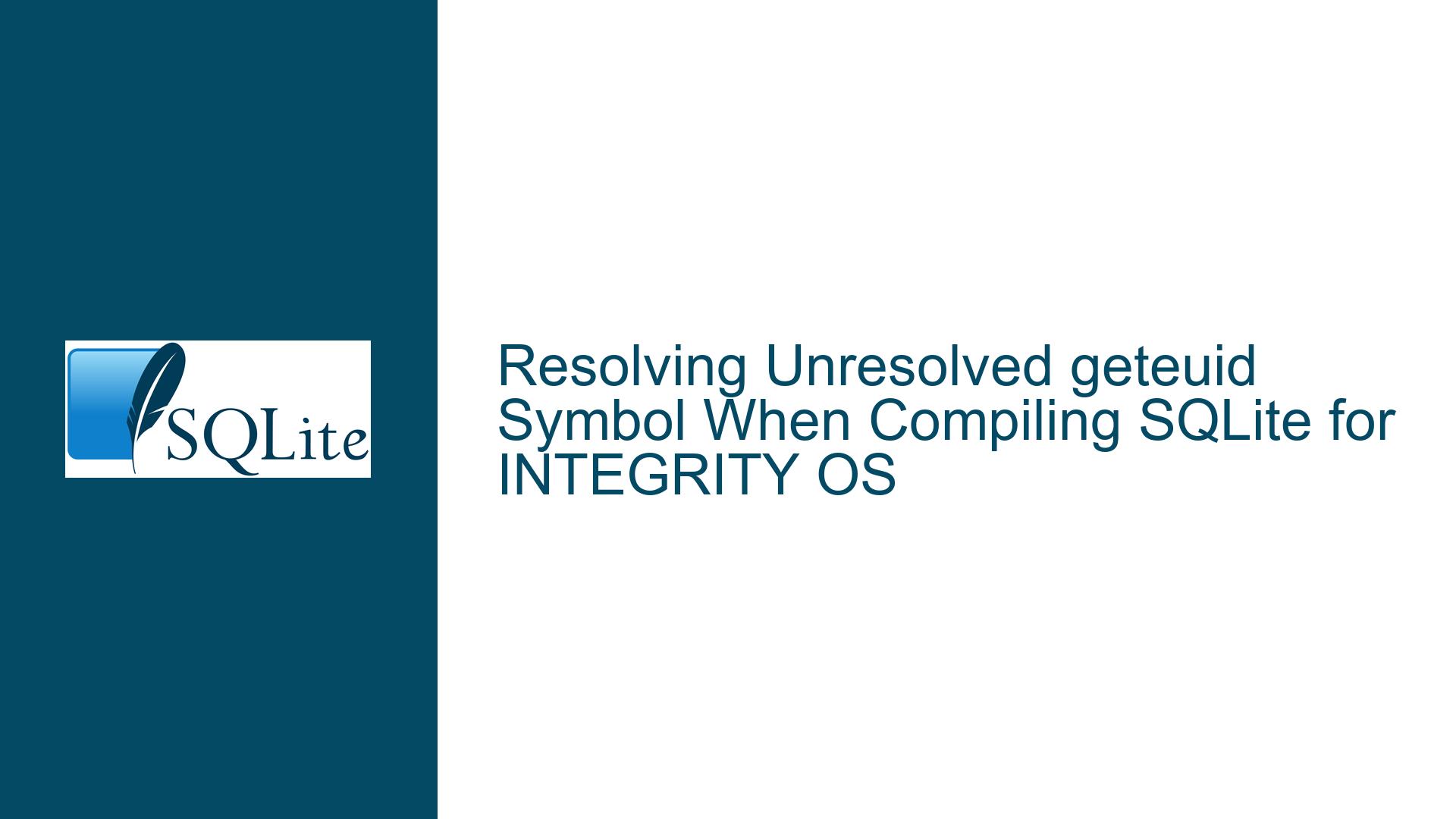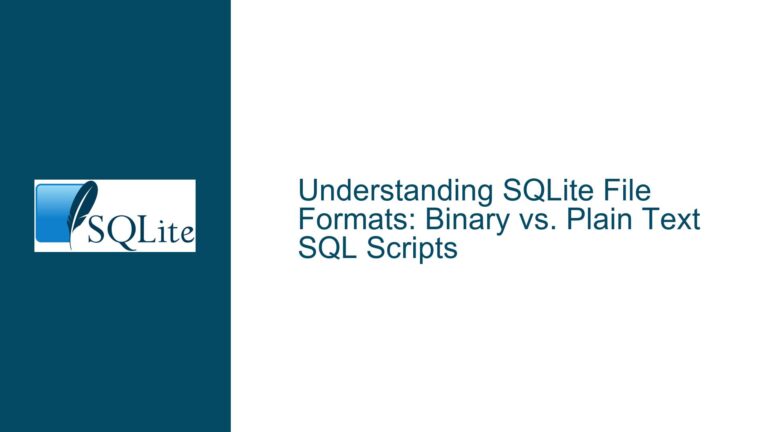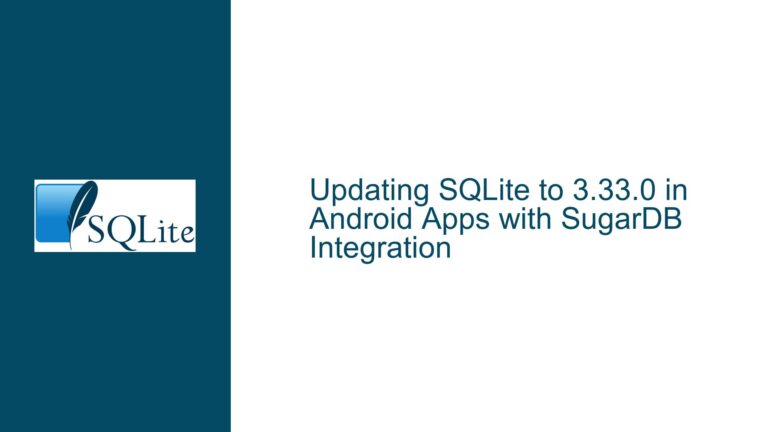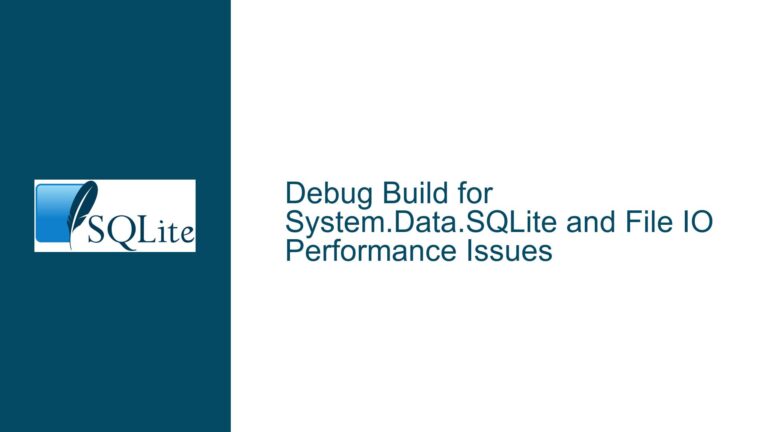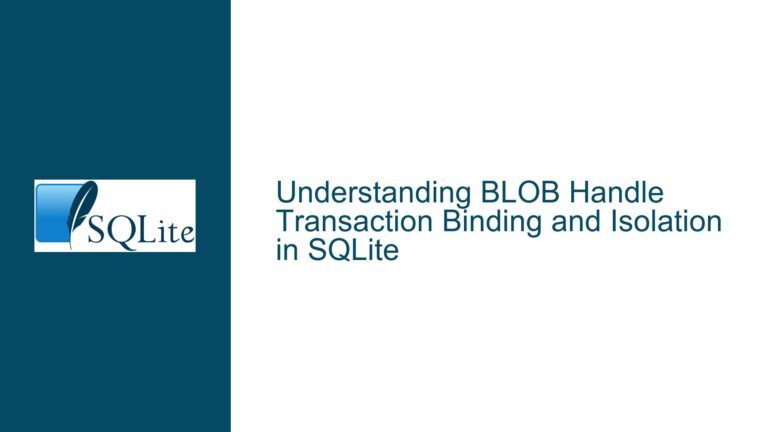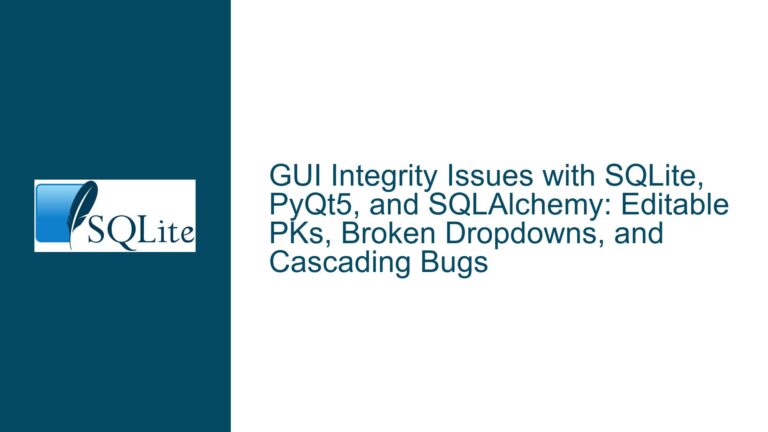Resolving Unresolved geteuid Symbol When Compiling SQLite for INTEGRITY OS
Missing uid_t API Support in INTEGRITY OS PJFS and SQLite Compilation Failures
Issue Overview: Unresolved geteuid During SQLite Linking on INTEGRITY OS
When attempting to compile SQLite for INTEGRITY OS using the GHS compiler, the linker reports an unresolved symbol error for geteuid during the final stages of building the application. This error arises because the Partitioning Journaling File System (PJFS) in INTEGRITY OS does not implement a subset of POSIX-compliant user identity (uid/gid) management functions, including geteuid, chown, setuid, and related APIs. SQLite’s default build configuration assumes these functions are available on Unix-like systems, as it relies on them for optional features such as file ownership checks and permissions enforcement. When the target platform lacks these functions, the linker cannot resolve their references, leading to a fatal error that halts the build process.
The problem mirrors SQLite’s handling of VxWorks, a real-time operating system (RTOS) with similar constraints. In the VxWorks port, SQLite uses a platform-specific header (vxworks.h) and conditional compilation to exclude code that depends on unsupported APIs. The absence of an analogous configuration for INTEGRITY OS forces the compiler to include uid/gid-related code paths, resulting in linker errors. The core challenge lies in adapting SQLite’s build system to recognize INTEGRITY OS as a platform where these functions are unavailable and to exclude or replace the problematic code.
Possible Causes: uid/gid Function Dependencies in SQLite’s Unix OS Layer
The unresolved geteuid symbol and related linker errors stem from SQLite’s reliance on POSIX-compliant user identity management functions in its Unix OS abstraction layer. These functions are used in specific scenarios, such as enforcing file permissions during database file creation or modification. However, not all operating systems that use a Unix-like file system implement the full suite of uid/gid functions. INTEGRITY OS, designed for safety-critical systems, omits these functions in its PJFS implementation to reduce complexity and attack surface. When SQLite is compiled for such environments, the build process includes code that references these missing functions, causing linker failures.
Three primary factors contribute to this issue:
Incorrect Preprocessor Definitions: SQLite uses preprocessor macros (e.g.,
HAVE_FCHOWN,HAVE_GETEUID) to conditionally include or exclude code that depends on specific OS APIs. If these macros are erroneously defined during compilation for INTEGRITY OS, the compiler will generate references to unsupported functions.Lack of Platform-Specific Configuration: Unlike VxWorks, which has a dedicated header (
vxworks.h) and build flags to disable uid/gid functions, INTEGRITY OS lacks equivalent configuration in SQLite’s source tree. Without this, the build system defaults to assuming a full POSIX environment.Incomplete File System Abstraction: SQLite’s OS abstraction layer (os_unix.c) does not account for PJFS’s limitations. Functions like
sqlite3_randomness(which indirectly relies on/dev/urandom) or file ownership checks may assume the presence of uid/gid APIs, leading to implicit dependencies.
Troubleshooting Steps, Solutions & Fixes: Configuring SQLite for INTEGRITY OS
To resolve the unresolved symbol errors and successfully compile SQLite for INTEGRITY OS, follow these steps:
Step 1: Disable uid/gid-Related Preprocessor Definitions
SQLite’s build system uses preprocessor macros to enable or disable platform-specific code. For INTEGRITY OS, you must ensure that macros corresponding to unsupported uid/gid functions are not defined. This includes:
HAVE_FCHOWNHAVE_GETEUIDHAVE_SETUID
Modify your compiler flags to explicitly undefine these macros. For example, with the GHS compiler, add:
-DHAVE_FCHOWN=0 -DHAVE_GETEUID=0 -DHAVE_SETUID=0
This instructs the preprocessor to treat these macros as false, excluding code blocks guarded by #if HAVE_GETEUID or similar directives.
Step 2: Create a Platform-Specific Configuration Header
Following the VxWorks example, create a header file (e.g., integrity.h) that defines INTEGRITY OS-specific configurations. This header should:
- Undefine macros for unsupported functions.
- Define
SQLITE_OMIT_LOAD_EXTENSIONif dynamic loading is not needed. - Override default file locking mechanisms if PJFS uses a different approach.
Example integrity.h:
#ifndef SQLITE_INTEGRITY_H
#define SQLITE_INTEGRITY_H
/* Disable uid/gid functions */
#undef HAVE_FCHOWN
#undef HAVE_GETEUID
#undef HAVE_SETUID
/* Use alternative file locking if necessary */
#define SQLITE_DEFAULT_LOCKING_MODE 1 /* Exclusive locking */
#endif /* SQLITE_INTEGRITY_H */
Include this header during compilation using -include integrity.h.
Step 3: Modify the OS Abstraction Layer
If disabling macros alone does not suffice, modify os_unix.c to replace or stub out functions that depend on uid/gid APIs. For example, replace osGeteuid() with a function that returns a default value (e.g., 0):
#if defined(__INTEGRITY)
#define geteuid() 0 /* Stub for unsupported geteuid */
#endif
Place this override in a platform-specific section of os_unix.c or within your integrity.h header.
Step 4: Validate the Build Configuration
After applying these changes, recompile SQLite and inspect the linker output for remaining unresolved symbols. Use tools like nm or objdump to verify that no references to geteuid or related functions exist in the object files. If issues persist, revisit the preprocessor macros and ensure all uid/gid dependencies are disabled.
Step 5: Test SQLite Functionality
Once the build succeeds, conduct thorough testing to ensure that the absence of uid/gid functions does not impact critical operations. Focus on:
- Database file creation and permissions.
- Concurrent access in multi-threaded environments.
- Transactions and journaling mechanisms.
If unexpected behavior arises (e.g., permission denied errors), consider further customizations to the OS abstraction layer or file system interactions.
By systematically excluding unsupported functions and adapting SQLite’s OS layer to INTEGRITY OS’s constraints, you can achieve a stable build without unresolved symbol errors. This approach aligns with SQLite’s design philosophy of configurability and portability across diverse embedded systems.
